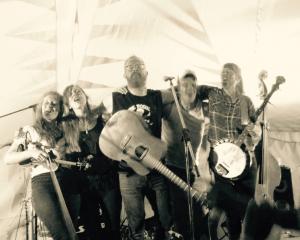As far as sobriquets go, "The Ringleader" fits Jon Hume quite well.
The singer, song-writer and guitarist for Melbourne-based band of brothers Evermore, Hume is also the producer of the group's new release, Truth Of The World: Welcome To The Show, a 13-song concept album that, in the age of the downloadable single, is both commercially and creatively brave.
Having built a career on radio-friendly pop singles such as Light Surrounding You, It's Too Late, Running and Come To Nothing, Hume and his brothers, drummer Dann and bass player/keyboardist Peter, have taken a detour from the mainstream.
Instead they have pored over some of their favourite albums of the past and mixed classic rock histrionics (perhaps minus the guitar solos) with the pulsating textures of modern electronica. And it comes complete with a future-world narrative in which a single media giant dominates civilisation by spoon-feeding propaganda and inane entertainment in equal measure.
"It's nearly three years since [previous album] Real Life came out and over that time we've gradually developed this new album, which has quite a different sound," Hume explained via telephone during a brief visit to Auckland last week. "For us it seemed a fairly smooth evolution, but I guess from an outsider's point of view it is quite sudden.
"I think we just wanted to challenge ourselves and explore something new as a band. A concept album is something we've wanted to do for a really long time. We grew up listening to some really cool albums," Hume says, running through a quick inventory that includes The Beatles' Sgt Pepper's Lonely Hearts Club Band, Pink Floyd's Dark Side of the Moon and The Wall and The Who's Tommy and Quadrophenia.
Hume says Truth Of The World has also been influenced by Ray Bradbury's 1953 novel Fahrenheit 451 as well as visits to the United States and United Kingdom.
"It was a lot of fun to imagine. We spent a lot of time reading trashy tabloid stories from the UK and US mainly and incorporating those ideas into our lyrics and songs. I remember when we were in America working on our last record; there were these non-stop ads for pharmaceuticals for every ailment you could imagine. That managed to make its way on there as well."
Like many concept albums, Truth Of The World uses a third-person narrative to explore its various themes. The approach allowed the group plenty of room to roam, whether it is from the perspective of The Ringleader (Jon), right-wing newsreader Donovan Earl (as played by Dann) or the Soldier (Peter).
"Musically, we tried to replicate what you'd imagine would be the right feelings for a particular character," Hume explains. "For Donovan Earl, we had this slightly military beat in the background, a very pompous feeling. Then, for Max we had this weird, almost vaudeville feeling to the sounds."
Truth Of The World took 18 months to complete, Hume describing it as a "massive undertaking". The underlying script and themes had to evolve at the same time as the music, and each track had to present a rise and fall in the album's dynamics.
"I don't think we would have found any normal producer prepared to take it on given the time it required. A lot of bands can record an album in a matter of weeks - and there have been some great albums made that way - but this one was like composing something. Every song was another chapter in the story; every song had to work with those surrounding it. It took quite a long time to get that balance right."
In making Truth Of The World, Evermore enjoyed a luxury of time and creative freedom, both of which stem from the fact the trio worked in their own Melbourne studio, built from the proceeds of previous albums.
Hume, in something of an understatement, describes the studio as "a really good asset to have". What he means is the band requires no advance funding to record its songs. Though it is signed with Warners, Evermore's deal means it can shop around outside Australia and New Zealand.
"We can talk to whoever is the most interested. I think we're planning to go to the States in about a month," he says in reference to a series of small performances to showcase the album.
They will also be a prelude to planned tours of New Zealand and Australia in June, which makes sense given Evermore's strong transtasman sales record: according to Warner Music, it has sold more than 250,000 albums, mostly in Australia, where it has been based since the release of 2004 debut album Dreams.
The group also has industry recognition: in 2005, it won a Silver Scroll Award for It's Too Late, beating fellow finalists Dave Dobbyn, Goldenhorse, Pluto and the Mint Chicks; the following year it was signed by US label Sire, led by Seymour Stein, whose previous discoveries include Madonna, the Ramones and Talking Heads; and in 2007, it won Tui awards for International Achievement and Single of the Year for Light Surrounding You.
Other significant developments along the way include having singles It's Too Late and For One Day featured on the soundtrack of American television drama The OC.
Most recently, new single Hey Boys and Girls entered the New Zealand music chart three weeks ago at 29, moving to No 10 this week.
Evermore's track record notwithstanding, it takes confidence to release a concept album. To do so requires a faith that the songs will stack up.
If they don't, the project risks being deemed a laughable experiment, one likely to put off both the public and those in charge of the marketing and distribution purse strings. Hume is only too aware of this.
"We didn't want to make an album and say it was a concept album when it wasn't. We wanted people to read the lyrics and those alone to be enough to provide a journey, a story. Then, also, the music needs to reflect that. We spent a lot of time working on how songs could flow from one to the next without stopping. That was quite hard to achieve, but quite rewarding when we listen to the album now."
At just over an hour, Truth Of The World is not a particularly challenging listening experience. It may be conceptual, but there's playfulness, both in the largely upbeat music and the lyricism, that ensures it doesn't take itself too seriously.
"We are using humour quite a lot to get across our ideas," Hume agrees. "We wanted some darkness in there but wanted to balance that with some humour. Because we are a band, we are constantly involved with the media. We're not taking some high moral ground. Sure, at some points we're having a dig at some aspects of media, but we are also making fun of ourselves in a way.
"Someone asked us if we had something against the media, but it's not that. It was just a fun idea for an album and opened up a lot of possibilities."
However, in creating a set of rock alter-egos, the Hume brothers have made a rod for their own backs. Welcome To The Show may be the album's subtitle, but it also means the band has a bit of work to do to successfully transfer its studio ideas into live performance.
"We are going to play the album as a single piece of music live ... then we might have a break and play some tracks off the other records - five or six old songs. We want to use the show to get across the story of the album," Hume says, adding Evermore will use banks of television screens as per its video for first single Between the Lines.
"In a live situation you can use visual as well as audio to take people on a journey.
"I think creatively we've definitely raised the bar. The other albums - even though I do like them - are more standard, more like what other people are putting out. We're not really sure if we've finished with the Truth Of The World idea yet . . . we'll just focus on touring and see how this pans out."
Though the former Feilding boys now live in Melbourne, they get back home "all the time". They've led a nomadic existence. On first arriving in Australia, they spent several months at friends' houses in Sydney before getting a flat of their own in the city, then moved to the Central Coast, New South Wales, where they shared a house and did a lot of the pre-production work for Real Life. They then headed back to Sydney before leaving for the rock vibe of the Victorian capital.
In a 2007 interview, younger brother Dann said the band members preferred to keep low profiles. Not for them the constant industry parties. However, the theatrics of Truth Of The World beg the question: is it time to play the glitzy game?
Hume: "I don't know, really. We want to keep the focus on our music. We go to music awards and have a few drinks and be friendly and all that, but you've got to keep track of the real world. I think being in a band with your brothers helps you do that."
There is a brief discussion on the merits, or otherwise, of taking Donavan Earl, The Ringleader or The Soldier beyond the confines of the album, to blur the lines between construct and celebrity. At this stage, however, Hume prefers to play it straight.
"We are using interviews and such to explain what the album is about, to help people understand it and get a way into it, rather than continue our characters beyond the live show or the album."
He then makes his farewell: "I've got to go and do a TV thing".
Reality and fiction collide. Bang, crash. It's rock, back-to-the-future.












